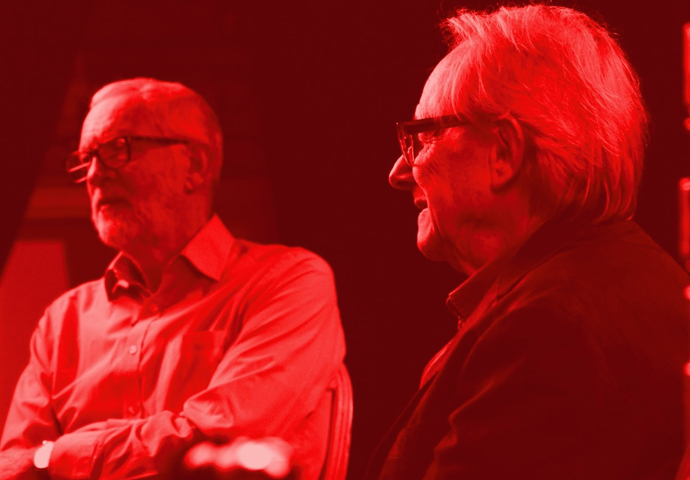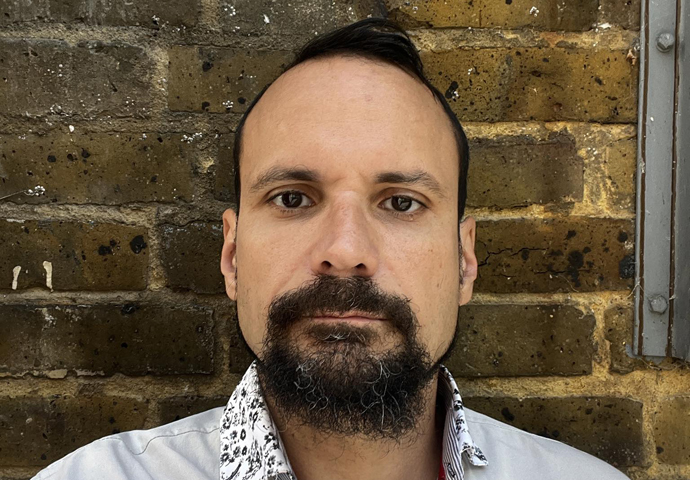The ‘bad patriot myth’: how Corbyn and Loach were turned into bogeymen
Victor Fraga tells Dan Carrier that his latest film asks why the media demonise the likes of Jeremy Corbyn and Ken Loach
Friday, 2nd May 2025 — By Dan Carrier

Jeremy Corbyn, left, and Ken Loach in The Bad Patriots
THEY look like two mild-mannered geography teachers at parents’ evening, gently explaining why your child got a B instead of an A. Patient, thoughtful and above all kind – not the image many were presented with when Jeremy Corbyn was a handful of seats away from dethroning Theresa May in 2017, or when Ken Loach scooped the Palme D’Or at Cannes.
It is a perpetual conundrum for the British media: how to create a bogeyman reputation of two gentle characters who put justice and empathy at the heart of what they do.
Both have built careers on virtues that in a blind taste test many would say are intrinsically British values: democracy, the rule of law, equality of access to justice, supporting the underdog, honesty, openness, free speech, agreeing to disagree in a mutually respectful way and a whole heap of other platitudes opinion polls and surveys like to parade as particularly British.
For filmmaker Victor Fraga, the paradox of how Ken Loach and Jeremy Corbyn have been demonised and cast as peculiarly traitorous and anti-British is a tangled conundrum – and one he sets out to explore in a new documentary about the Islington North MP and the director from Kentish Town.
Victor, who lives in Camden Town, runs Dirty Movies, a film website that combines criticism and features with a production company.
In The Bad Patriots, Victor considers the muck chucked in their direction: called anti-British, spineless, out-of-touch, terrorist-sympathisers, communists, and even a threat to national security, he considers how the media landed some “unsavory accolades” on the social realist filmmaker and former Labour leader.
Here, he gives them a platform to talk about how it has felt to be on the receiving end of vicious attacks – the impact it has had on them personally, and what it says about the UK in general.
The film is the second in a trilogy he is making exploring media bias and the creation of the “bad patriot myth” – that somehow their championing of working-class voices and their concept of a better life for all pitches them against the national interest.
In 2016, he turned his lens to his home country of Brazil, considering how the country’s media was complicit in the rise of the far right.
His film, The Coup D’Etat Factory, exposed the tactics used by newspapers and broadcasters to create a negative narrative around

Victor Fraga
Lula Da Silva’s Workers’ Party that paved the way for the government of far right reactionary Jair Bolsonaro.
The third, yet to be released, features political thinker Noam Chomsky
“I came across really dirty manipulation tactics,” he reflects. “A lot of people believed these highly questionable strategies were confined to the so-called peripheral world, coup d’etats, character assassinations, law fare, grotesque slandering – surely these things couldn’t happen in the UK, right?”
Watching the career-long hatchet jobs launched on Loach and Corbyn chimed with the conditions he had uncovered in Brazil.
Inviting Ken – described as perhaps the most influential social realist director in the world and the only British person to have won Cannes twice – to explain how his work has been construed gives the filmmaker a platform to consider how bodies such as the BBC have stymied discussion that the status quo would find unpalatable.
“In some issues they are liberal – for example, gender politics – they are very progressive, if progressive means supporting the women’s movement,” Loach states in the film.
“In social issues by and large they will not shy away from pointing out issues of homelessness, the use of food banks, the desperate poverty – they are happy to show that. But the jump they will not make is to say this is the political cause of it and this is how we can begin to fight back and this is how we sort it out.
“They see the working class as victims or as brave people, supporting those in trouble. They do not like to see them as organisers. They do not like to see the strength of the working class.”
With this in mind, Victor describes how he felt a sense of growing disillusionment with the UK’s media landscape and the stories that get told.
“Brazilians tend to look upon the UK as a model of media balance… if they only knew,” he explains.
The attacks on Corbyn were prolonged and vicious.
“I was saddened, but not surprised,” he says. “The amount of air time that Nigel Farage received over the years, compared to the near-complete erasure of Corbyn, helps to explain why Reform is doing well in the polls.”
To start, the filmmaker seeks to explain what the world patriot means today. “Patriotism and nationalism are medieval concepts seeking to forge a new type of identity,” he says.
“The tawdry type of nationalism peddled by Farage and Starmer is pure flag-shagging and jingoism, devoid of any genuine social concerns.”
And making the film was a reminder of the criticism Corbyn faced as he attempted to create an electorally successful progressive movement via the Labour Party.
For Victor, it wasn’t the extremes the obvious opponents in the national press would go to that surprised him, more the behaviour of newspapers he expected to produce a detailed critique of the Corbyn project.
“The consistent, daily smearing of Corbyn in The Guardian – where I worked seven years and prides itself in being “left wing” – was surprising,” he says.
The range of forces that gathered to smear Corbyn, and the same forces that tried to stop cinemas screening Loach’s films, is down to the pair’s calm application of their philosophy, he adds.
“They are genuine and dignified socialists, loyal to their beliefs,” he says.
“Big bosses are terrified that they will make them pay their taxes. It really is as simple as that.”
• For screenings, see: https://dmovies.org/